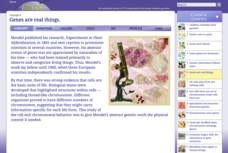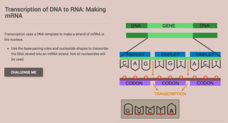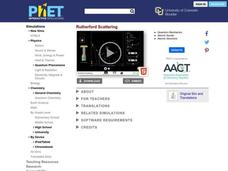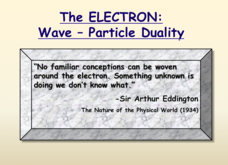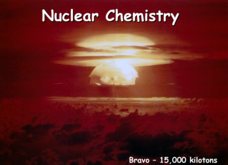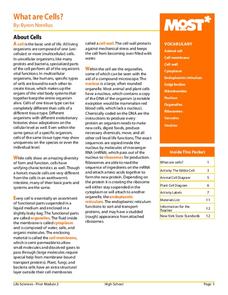Community Resources for Science
A Whole New World of DNA and Proteins
Lead your young scientists into an exciting world as they participate in a role play and experiment focused on proteins and DNA. After researching the Central Dogma of Biology, individuals or groups participate in a classroom slide...
Virginia Department of Education
Cell Parts
What do a bird, an egg, a rabbit, and a toad all have in common? This fun-filled resource explains the similarities and differences between cells and how all cells are similar, yet all are different. Learners begin by depicting a...
Curated OER
Cell Organelles
Now, this is a clever approach to understanding cell organelles; seven pairs of organelles are listed, and pupils write an explanation of how each pair cooperates to perform certain cell functions. Organelles include the nucleus,...
K20 LEARN
What's My Purpose In This Life? Intro To Cell Theory/Organelles
Why are we here? Well, if you happen to be a Golgi body, the answer is simple! Young biologists embark upon a journey through the tiny world of cellular organelles with an engaging lesson from the K20 Center. The activities open with an...
Cold Spring Harbor Laboratory
Higher Cells Incorporate an Ancient Chromosome
Chromosomes contain keys to history including links from royalty to Neanderthals. Young scientists learn about Ivan Wallin's research into chromosomes with an animation and videos. Then, the concept connects to mysteries related to...
Cold Spring Harbor Laboratory
Genes Are Real Things
Proving microscopic structures exist is a difficult task. Learn how scientists did just that in the mid-1800s as they set out to identify the cellular structures related to genetics. The online lesson explains the collection of work that...
Biology Junction
Cellular Structure
The human body contains more than 200 types of cells, and plants contain many other unique types of cells. While a huge variety of cells exist, they appear to have very similar structures. A detailed presentation describes the structure...
Howard Hughes Medical Institute
Viral DNA Integration
How do reverse transcriptase inhibitors work? Young virologists examine the function of azidothymidine, a drug doctors use to treat HIV patients, during a hands-on modeling activity. Groups create a strand of DNA from an HIV RNA strand...
Science 4 Inquiry
Eukaryotic Cells: The Factories of Life
Eukaryotes include humans, animals, and plants. Scholars learn about the parts of eukaryotic cells. They design models of a store and match the correct function of each part to the function of a part of the cell. They review their...
Cornell University
Isotope Rummy
Thanks to this game, teaching isotopes will never be the same. Physical science scholars work their way toward understanding isotopes in an entertaining game. Pupils play rummy in groups while practicing good sportsmanship and creating...
Cornell University
Bacteria Take Over and Down
Bacteria outnumber all other forms of life on Earth. Scholars observe the growth of bacteria in petri dishes to understand their role in maintaining good health. Then, they observe the growth of bacteria after they introduce...
CK-12 Foundation
Transcription of DNA to RNA: Making mRNA
Transcription means a written copy but how can DNA write a message? The video explains transcription and translation as they relate to DNA and RNA. Then in the interactive, scholars practice base pairing and answer analysis questions...
LABScI
The Rutherford Atomic Model: Hidden Obstacles
Historically, scientists had to be creative to study subatomic structure. Scholars step into their minds to recreate the procedure Rutherford used to create his atomic model. Learners identify the creative efforts of early scientists...
PhET
Rutherford Scattering
Rutherford performed his famous experiment in 1907 with Marsden, showing the true atomic structure. This interactive simulation compares Rutherford's historical experiment to the Plum pudding model of the atom. In both models, alpha...
Science Geek
The Dual Nature of the Electron
Why don't atoms collapse? Scientists debated this concept for years before they understood the dual nature of the electron. Presentation discusses the electron as both a particle and an energy wave. It also relates these concepts to the...
Science Geek
The Hydrogen Bomb
Recycled Russian nuclear weapons provide 10 percent of the nuclear energy that the United States uses. The short presentation discusses the Teller-Ulam device. It provides a diagram of the parts as well as a description of the four...
Science Geek
Atomic Structure
The International Union of Pure and Applied Chemistry (IUPAC) was formed in 1919 and was crucial for allowing scientists to discuss findings during the Cold War. A presentation offers an introduction to atomic structure including the...
Science Geek
Nuclear Chemistry
Which bichemicals wash up on shore? Nucleotides! Presentation covers alpha, beta, and gamma radiation. Includes a comparison of fission versus fusion. Presentation is the second in a five-part series.
Mr. Jones's Science Class
Parts of the Atom
Up and atom! After labeling the parts of an atom, young chemists answer 16 diagram-based questions that deal with protons, neutrons, electrons, and atomic number.
It's About Time
Are Atoms Invisible?
Wow, an experiment that allows the class to participate in a missile war! Pupils discuss Thomsons's theory of cathode rays and simulate Rutherford's historical experiment to learn about atomic structure. They conclude this fourth lesson...
Odell Education
Plant and Animal Cells
Incorporate multiple facets of the cell into your next high school lab! Through an introduction to cell organelles, class members observe each cell type and draw visuals to further demonstrate understanding of cellular processes in both...
Curated OER
What Are Cells?
Energize the cells of young biologists with an edible life science activity. Engaging learners in exploring the inner workings of plant and animal cells, this activity involves using colored jello and various sweet and tasty treats to...
Lincoln Public Schools
Cell Exploration Activities
Engage young biologists in exploring the mysteries of life with this collection of hands-on activities. Enlisting the help of numerous digital resources, students get an up-close look at the structure of plant and animal cells as they...
The Science Spot
Cells & Organelles
Familiarize young biologists with the inner workings of eukaryotic cells with this vocabulary worksheet. By cutting out and matching a series of definitions and memorization tips to the organelles listed in the provided table, students...







